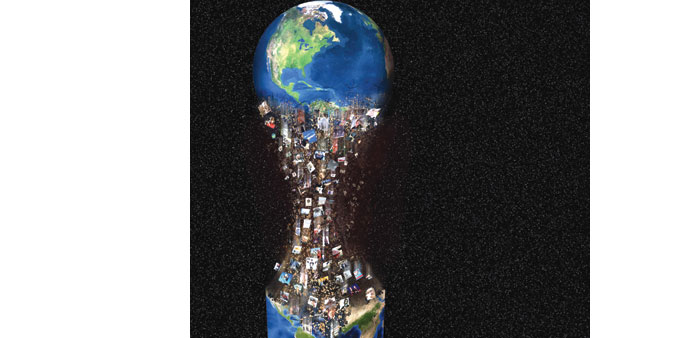|
Change is never permanent but always changing - this doctrine was conceived by the Greek philosopher Heraclitus in around 500 BC to define the state of the universe and of being. |
We tend to be nervous of change because it is unfamiliar - we sense the loss of ourselves, existing in a world that we have no real control over. The most graphic example demonstrating how our evolving world impacts on all human life is in medicine.
Approximately 400,000 people around the world suffer from the comparatively rare disorder retinitis pigmentosa.
The condition causes you to lose your sight due to a slow breakdown of cells in the retina.
But sufferers may now be able to regain partial vision by using an implantable device called Argus II.
Developed by Second Sight, the device consists of a small video camera and transmitter mounted on a pair of spectacles.
Images captured by the camera are processed into electronic data and then wirelessly transmitted to electrodes implanted into your retina.
In a recent study, 30 patients blinded by the disease showed that they were now able to perform daily activities such as navigating streets and curbs, matching different coloured socks and even reading large type.
With prosthetic limbs linked directly to the brain, movement of a ‘bionic’ arm or leg can be controlled by the mind.
Zac Vawter used a thought-controlled bionic leg to help climb 103 floors of Chicago’s Willis Tower, and Glen Lehman is one of many war veterans who uses a “thinking” hand, to replace his original hand lost in battle.
There is even the i-Limb Ultra, an artificial hand that allows each five artificial fingers to function independently, directed solely by the owner’s thoughts and intentions.
In 1997, Cathy Hutchinson had a stroke, leading to the complete paralysis of her arms.
She volunteered to undergo an early experimental operation.
Scientists implanted a small device in the damaged part of her brain responsible for motor control. She is now able to “magically” control her new robotic arms.
Researchers had tested the brain implant on monkeys and discovered that they were able to control a robotic arm 7,000 miles away.
The brain signals from a monkey were transmitted across the internet, from Duke University in North Carolina to a robotic arm placed in Japan.
Some 220,000 profoundly deaf people have now been successfully fitted with cochlear implants that turn sound waves into electrical impulses, which are then forwarded to the auditory nerve.
Tens of thousands of Parkinson’s disease sufferers have been implanted with deep brain stimulators that transmit an electrode into several areas of the brain.
The methodology has recently been tested to help combat clinical depression and obsessive-compulsive disorder with surprisingly encouraging results.
Before we grow too complacent about mankind’s astonishing advances in many fields, remember we still don’t have enough combined human intelligence, resources or money to supply clean water to everyone on the planet.
You will be familiar with TV commercials for charitable organisations, asking for individual donations to help provide clean water supplies to blighted areas around the world.
But in Peru, they are attempting to enlist an advertising poster hoarding itself to produce clean water.
The University of Engineering and Technology in Lima and advertising agency Mayo DraftFCB have developed a project called the Water Billboard. Its components consist of: one poster billboard, five filtration devices and Lima’s extremely humid air.
It simply turns humidity into water.
The billboard project not only demonstrated how Lima’s air could help its 1.2mn residents, many of whom don’t have clean running water; the advertisement itself encouraged teenagers to apply to UET and study engineering.
Of course, history books provide the clearest demonstration of how change and upheaval have always played a key part in our lives.
Empires that appeared to have an incontrovertible permanence eventually crumble. Civilisations that straddled much of the earth, conquering and dominating for centuries, all finally collapsed.
The Roman Empire was founded after the fall of the Byzantine Empire and ruled much of the planet for 2,214 years.
The Mongol Empire stretched from China to Vietnam and across to Hungary, and was one of the most dominant of mankind’s rulers, until it too dissipated. The Russian Empire existed from 1721 until the Revolution of 1917, and at one point in 1866 reached from Eastern Europe across Asia and into North America.
At its greatest ascendency, the British Empire was once the largest in history, spanning more than 13mn square miles, and governing 500mn people.
The legacy it imparted on those conquered lands in terms of political reform, cultural exchange and a way of life made English the de facto standard language of the world.
However admirable the British were in many ways, they also introduced the world to the African slave trade, mechanised warfare, brutal suppression of independence movements - and drew much of their income from drug trafficking, resulting in the Opium Wars.
But it would be no exaggeration to say that, as a civilising powerhouse, the influence and changes brought about by Britain are probably as profound as the many glories of Rome.

